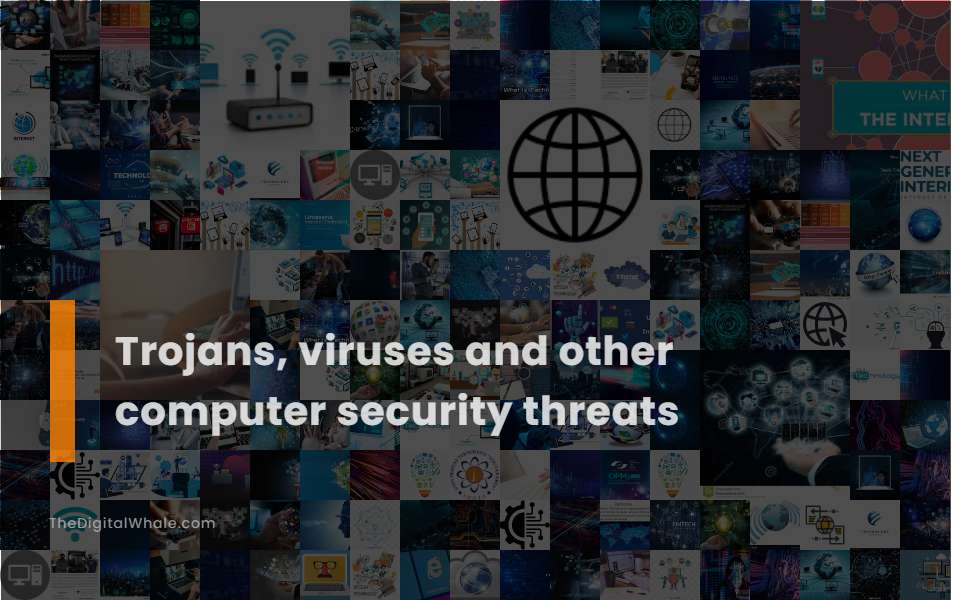Trojans, Viruses and Other Computer Security Threats
What is a computer virus? What is the difference between a virus and a worm? Let's find out more about Trojans, Viruses and Other Computer Security Threats.

Backdoor Trojan: Creates a virtual backdoor for remote access and control.
A Backdoor Trojan creates a hidden mechanism that allows attackers to gain remote access to a system, bypassing normal security controls. This enables them to perform malicious activities such as stealing sensitive information, installing malware, and controlling the system without detection. To understand more about how these threats operate, visiting the TechTarget website can provide valuable insights and details on preventative measures and detection techniques.
DDoS Trojan: Performs Distributed Denial of Service attacks to take down networks.
A DDoS Trojan is a type of malware that enables Distributed Denial of Service (DDoS) attacks by turning infected computers into bots that, when commanded, flood a targeted server or network with requests, overwhelming it and making it inaccessible to legitimate users. These trojans can cause significant disruptions to online services and compromise the usability and safety of digital information. To understand more about how these threats operate and their impact, visit the Kaspersky Resource Center, where comprehensive details and protective measures are available.
Downloader Trojan: Downloads and installs new malicious programs on already-infected computers.
A Downloader Trojan is a type of malware that installs malicious software or files onto a victim's device without their knowledge. It focuses on downloading and executing additional malware from a remote server controlled by the attacker, and it cleverly hides its processes to remain undetected. For more comprehensive insights into such cybersecurity threats, you can explore the detailed information on this [Downloader Trojan](https://nordvpn.com/cybersecurity/glossary/downloader-trojan/) page. Understanding this malicious software is crucial for ensuring a secure digital environment.
Fake AV Trojan: Mimics antivirus software to demand money for fake threats.
The Fake AV Trojan, belonging to the FakeRean family, cleverly mimics antivirus software by displaying fake alerts and scans to frighten users into purchasing bogus protection, thereby blocking access to legitimate applications and terminating security services on the infected machine. Such Fake AV scams are part of a larger scheme, utilizing malware that impersonates legitimate antivirus programs through aggressive pop-ups. They exploit the Windows notification system to deceive users into purchasing either phony or genuine antivirus products. This malicious activity often earns commissions through affiliate programs, diverting revenue from legitimate companies while preying on the unwary digital consumer.
Polymorphic Virus: Mutates its code to avoid detection by antivirus software.
A Polymorphic Virus is a type of malware that mutates its appearance or signature files through new decryption routines, making it difficult for traditional antivirus software to detect, as it changes its file name, size, or location while retaining its original malicious function. This adaptability allows the virus to evade detection by security systems, presenting a significant challenge for cybersecurity professionals. To learn more about its complex nature and implications, visit the detailed guide on CrowdStrike.
Related:
What are some benefits of technology in the workplace? What is big data and how does it impact businesses? Let's find out more about The Changing Landscape of Work - Technology's Impact.
Rootkit Trojan: Hides malware to prevent its discovery and maximize damage.
A Rootkit is a type of malware that establishes continuous privileged access to a computer, hiding its presence and allowing it to remain undetected for extended periods. It can manipulate system files, intercept API calls, and alter network settings to conceal its activities and maximize damage, often facilitating the installation of other malicious software like ransomware, keyloggers, and Trojans. To gain a deeper understanding of this clandestine threat, you can explore more about Rootkits and their implications in the realm of cybersecurity.
Banker Trojan: Targets personal banking and transaction information.
A Banking Trojan is a type of malware designed to steal sensitive financial information, such as login credentials and account details, by operating stealthily and adapting to new vulnerabilities. These malicious programs utilize techniques like keylogging and screen scraping to gather and transmit data to cybercriminals. To learn more about how cyber threats evolve and the importance of staying protected, explore more on Banking Trojans and enhance your awareness to safeguard against potential attacks.
Infostealer Trojan: Steals data from infected computers.
Infostealer Malware, often classified as a type of Trojan, is designed to silently infect computers and exfiltrate sensitive information such as browser-saved credentials, session cookies, and other system data. This information is then distributed among criminal actors for financial fraud, cryptocurrency theft, or other malicious activities. To learn more about these threats, you can visit the detailed analysis provided by Flare.
Multipartite Virus: Infects boot sectors, memory, and files, making it hard to detect and remove.
Multipartite viruses are capable of infecting a computer in multiple ways, including boot-sector and file-sector infections, making them particularly challenging to detect and remove. These viruses can infect both the Master Boot Record (MBR) and executable files, leading to widespread and persistent system damage. For more insights on these complex threats, you can learn more about Multipartite Viruses at Cloudmersive, where detailed explanations about their mechanisms and impacts are provided.
Resident Virus: Saves itself in computer memory to infect other files even after the original program stops.
A Resident Virus is a type of computer virus that embeds itself in the computer's memory, allowing it to execute and infect files each time the system is booted or a specific action is performed, even after the original infected program has stopped running. For more detailed information, you can visit the website on Resident Virus and learn about its impact on cybersecurity.
Related:
What is the relationship between technology and productivity? Can technology help employees more easily track their progress in work? Let's find out more about How Technology Has Made Us More Productive.
